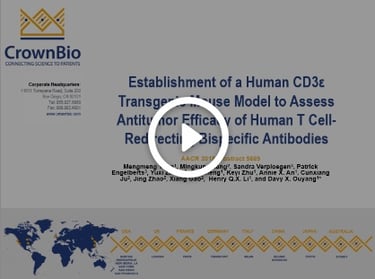- Our Services
- Platforms
- Target Solutions
- Technologies
- Service Types
- Our Science
- About Us
- Contact us
Mengmeng Yang, Mingkun Zhang*, Sandra Verploegen#, Patrick Engelberts#, Yuxi Zhang*, Lei Zheng, Keyi Zhu, Annie X. An, Cunxiang Ju*, Jing Zhao*, Xiang Gao*, Henry Q.X. Li, and Davy X. Ouyang
*Nanjing Biomedical Research Institute, Nanjing University, Nanjing, China;
#Genmab B.V., Yalelaan 60, 3584 CM Utrecht, The Netherlands T cell-redirecting therapy is taking a prominent role in immuno-oncology. Recent research has involved the development of T cell-redirecting bispecific antibodies, which bind to a specific tumor associated antigen (TAA) on tumor cells and CD3 (usually epsilon chain, CD3ε) on T cells. This physically links the tumor cell to the T cell which leads to MHC-independent recognition and killing of cells expressing the TAA.
T cell-redirecting therapy is taking a prominent role in immuno-oncology. Recent research has involved the development of T cell-redirecting bispecific antibodies, which bind to a specific tumor associated antigen (TAA) on tumor cells and CD3 (usually epsilon chain, CD3ε) on T cells. This physically links the tumor cell to the T cell which leads to MHC-independent recognition and killing of cells expressing the TAA.
However, research on new therapeutic T cell-redirecting antibodies is often hampered by a lack of appropriate in vivo models, due to the absence of cross-reactivity with mouse CD3ε. To meet this need, we have developed a human CD3ε BAC transgenic model in a BALB/c background.
The transgenic mice express both human and mouse CD3ε on more than 80% of T cells, and, unlike previously developed transgenic lines, the model is phenotypically normal with levels of T, B, and NK cells comparable to those in wild type BALB/c mice.
Your privacy is important to us.
We'll never share your information.
© 2025 Crown Bioscience. All Rights Reserved.
Privacy Policy | Imprint | Terms of Service | Privacy Preferences


© 2025 Crown Bioscience. All Rights Reserved. Privacy Policy
2023-12-08
2021-10-28
landing_page
PDX/Databases